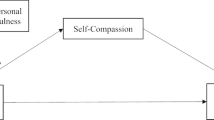Abstract
This study examined both the moderator effects of loneliness and gender on the relationship between self-esteem and life satisfaction in Chinese university students. 615 college students completed the measures of loneliness, self-esteem and life satisfaction. Hierarchical regression analysis showed that loneliness moderated the association between self-esteem and life satisfaction. When students reported a low level of loneliness, those with high self-esteem reported higher scores in life satisfaction than those with low self-esteem. However, the high and low self-esteem group had low level of life satisfaction when loneliness was high. Moreover, gender also moderated the link between self-esteem and life satisfaction. Self-esteem tended to be a more significant determinant of life satisfaction in the females than the males. The significance and limitations of the results are discussed.


Similar content being viewed by others
References
Aiken, L., & West, S. G. (1991). Multiple regression: Testing and interpreting interactions. Newbury Park, CA: Sage.
Baron, R. M., & Kenny, D. A. (1986). The moderator-mediator variable distinction in social psychological research: Conceptual, strategic and statistical considerations. Journal of Personality and Social Psychology, 51, 1173–1182.
Chipuer, H. M., Bramston, P., & Pretty, G. (2003). Determinants of subjective quality of life among rural adolescents: A developmental perspective. Social Indicators Research, 61, 79–95.
Çivitci, N., & Çivitci, A. (2009). Self-esteem as mediator and moderator of the relationship between loneliness and life satisfaction in adolescents. Personality and Individual Differences, 47, 954–958.
Corwyn, R. F. (2000). The factor structure of self-esteem among adolescents and adults. Journal of Research in Personality, 34, 357–379.
Diener, E. (1994). Assessing subjective well-being: Progress and opportunities. Social Indicators Research, 31, 103–157.
Diener, E., & Diener, M. (1995). Cross-cultural correlates of life satisfaction and self-esteem. Journal of Personality and Social Psychology, 68, 653–663.
Diener, E., & Diener, M. (2009). Cross-cultural correlates of life satisfaction and self-esteem. In E. Diener (Ed.), Culture and well-being (pp. 71–91). Netherlands: Springer.
Diener, E., Emmons, R. A., Larsen, R. J., & Griffin, S. (1985). The satisfaction with life scale. Journal of Personality Assessment, 49(1), 71–75.
Frazier, P. A., Tix, A. P., & Barron, K. E. (2004). Testing moderator and mediator effects in counseling psychology research. Journal of Counseling Psychology, 51, 115–134.
Goodwin, R., Cook, O., & Yung, Y. (2001). Loneliness and life satisfaction among three cultural groups. Personal Relationships, 8, 225–230.
Goregenli, M. (1997). Individualist-collectivist tendencies in a Turkish sample. Journal of Cross-Cultural Psychology, 28, 787–794.
Heine, S. J., & Lehman, D. R. (1999). Culture, self-discrepancies, and self-satisfaction. Personality and Social Psychology Bulletin, 25, 915–925.
Joshanloo, M., & Afshari, S. (2011). Big five personality traits and self-esteem as predictors of life satisfaction in Iranian Muslim University students. Journal of Happiness Studies, 12, 105–113.
Kapıkıran, Ş. (2013). Loneliness and life satisfaction in Turkish early adolescents: The mediating role of self esteem and social support. Social Indicators Research, 111, 617–632.
Kong, F., & You, X. (2013). Loneliness and self-esteem as mediators between social support and life satisfaction in late adolescence. Social Indicators Research, 110, 271–279.
Kong, F., & Zhao, J. (2013). Affective mediators of the relationship between trait emotional intelligence and life satisfaction in young adults. Personality and Individual Differences, 54, 197–201.
Kong, F., Zhao, J., & You, X. (2012a). Emotional intelligence and life satisfaction in Chinese university students: The mediating role of self-esteem and social support. Personality and Individual Differences, 53, 1039–1043.
Kong, F., Zhao, J., & You, X. (2012b). Social support mediates the impact of emotional intelligence on mental distress and life satisfaction in Chinese young adults. Personality and Individual Differences, 53, 513–517.
Kwan, V. S. Y., Bond, M. H., & Singelis, T. M. (1997). Pancultural explanations for life satisfaction: Adding relationship harmony to self-esteem. Journal of Personality and Social Psychology, 73, 1038–1051.
Lucas, R. E., Diener, E., & Suh, E. (1996). Discriminant validity of well-being measures. Journal of Personality and Social Psychology, 71, 616–628.
Mäkikangas, A., & Kinnunen, U. (2003). Psychosocial work stressors and well-being: Self-esteem and optimism as moderators in a one-year longitudinal sample. Personality and Individual Differences, 35, 537–557.
Oishi, S., Diener, E. F., Lucas, R. E., & Suh, E. M. (1999). Cross-cultural variations in predictors of life satisfaction: Perspectives from needs and values. Personality and Social Psychology Bulletin, 25, 980–990.
Pavot, W., & Diener, E. (1993). Review of the satisfaction with life scale. Psychological Assessment, 5, 164–172.
Peplau, L. A., & Perlman, D. (1982). Perspectives on loneliness. In L. A. Peplau & D. Perlman (Eds.), Loneliness: A sourcebook of current theory, research, and therapy (pp. 1–18). New York: Wiley-Interscience.
Proctor, C. L., Linley, P. A., & Maltby, J. (2009). Youth life satisfaction: A review of the literature. Journal of Happiness Studies, 10, 583–630.
Rosenberg, M. (1965). Society and the adolescent self-image. Princeton, NJ: Princeton University Press.
Salimi, A. (2011). Social-emotional loneliness and life satisfaction. Procedia-Social and Behavioral Sciences, 29, 292–295.
Shaver, P. R., & Brennan, K. A. (1991). Measures of depression and loneliness. San Diego, CA: Academic Press.
Wang, K. T., Yuen, M., & Slaney, R. B. (2009). Perfectionism, depression, loneliness, and life satisfaction a study of high school Students in Hong Kong. The Counseling Psychologist, 37, 249–274.
Zhang, L., & Leung, J. (2002). Moderating effects of gender and age on the relationship between self-esteem and life satisfaction in mainland Chinese. International Journal of Psychology, 37, 83–91.
Zhao, J., Kong, F., & Wang, Y. (2012). Self-esteem and humor style as mediators of the effects of shyness on loneliness among Chinese college students. Personality and Individual Differences, 52, 686–690.
Zhao, J., Kong, F., & Wang, Y. (2013). The role of social support and self-esteem in the relationship between shyness and loneliness. Personality and Individual Differences, 54, 577–581.
Author information
Authors and Affiliations
Corresponding author
Rights and permissions
About this article
Cite this article
Huo, Y., Kong, F. Moderating Effects of Gender and Loneliness on the Relationship Between Self-esteem and Life Satisfaction in Chinese University Students. Soc Indic Res 118, 305–314 (2014). https://doi.org/10.1007/s11205-013-0404-x
Accepted:
Published:
Issue Date:
DOI: https://doi.org/10.1007/s11205-013-0404-x




